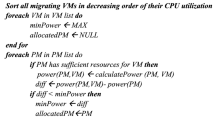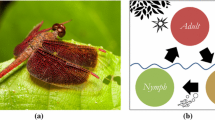Abstract
In this paper, we consider the problem of scheduling tasks of workflows to heterogeneous VMs (virtual machine) in a hybrid cloud. Workflow scheduling in a hybrid cloud is complex due to factors such as varying electricity prices, uncertain resource requirements, and workflow-specific budget and deadline constraints. To address these challenges, we propose a novel intelligent searching algorithm framework, SEPSO (Swarm Entropy based Particle Swarm Optimization). SEPSO enhances the scheduling process by introducing a swarm entropy, a measure that takes into account the diversification of each iteration. Additionally, we develop rules for sorting workflows and tasks that consider the budget and deadline constraints of each workflow. An iteration-varying flight parameter mechanism is also introduced to balance intensification and diversification during the search process. The components and parameters of our proposed algorithm were statistically calibrated using a comprehensive set of random instances. We then compared SEPSO to adapted existing algorithms for similar problems. Our experimental results demonstrate that SEPSO is effective for the considered problem, offering a solution to workflow scheduling that is more time efficient than traditional particle swarm optimization (PSO) algorithms.














Similar content being viewed by others
Data availability
The data that support the findings of this study are openly available in https://pan.seu.edu.cn:443/link/9952035B8F62087E31E955EDB2F0CD7D.
Notes
Code and Data available at https://cse.seu.edu.cn/2023/0708/c30019a451020/page.htm.
References
Zuo X, Zhang G, Tan W (2014) Self-adaptive learning PSO-based deadline constrained task scheduling for hybrid IAAS cloud. IEEE Trans Autom Sci Eng 11(2):564–573
Yuan H, Bi J, Tan W (2017) Temporal task scheduling with constrained service delay for profit maximization in hybrid clouds. IEEE Trans Autom Sci Eng 14(1):337–348
Liu Q, Zeng L, Bilal M, Song H, Liu X, Zhang Y, Cao X (2023) A multi-swarm PSO approach to large-scale task scheduling in a sustainable supply chain datacenter. IEEE Trans Green Commun Netw. https://doi.org/10.1109/TGCN.2023.3283509
Chen X, Zhang J, Lin B, Chen Z, Wolter K, Min G (2022) Energy-efficient offloading for DNN-based smart IoT systems in cloud-edge environments. IEEE Trans Parallel Distrib Syst 33(3):683–697
Zhao B, Liu X, Song A, Chen W-N, Lai K-K, Zhang J, Deng RH (2022) Primpso: a privacy-preserving multiagent particle swarm optimization algorithm. IEEE Trans Cybern. https://doi.org/10.1109/TCYB.2022.3224169
Yang L, Xia Y, Ye L, Gao R, Zhan Y (2023) A fully hybrid algorithm for deadline constrained workflow scheduling in clouds. IEEE Trans Cloud Comput. https://doi.org/10.1109/TCC.2023.3269144
Wang Z-J, Zhan Z-H, Yu W-J, Lin Y, Zhang J, Gu T-L, Zhang J (2020) Dynamic group learning distributed particle swarm optimization for large-scale optimization and its application in cloud workflow scheduling. IEEE Trans Cybern 50(6):2715–2729
Chopra N, Singh S (2013) Heft based workflow scheduling algorithm for cost optimization within deadline in hybrid clouds. In: 2013 Fourth International Conference on Computing, Communications and Networking Technologies (ICCCNT), pp 1–6
Bittencourt LF (2011) Hcoc: a cost optimization algorithm for workflow scheduling in hybrid clouds. J Internet Serv Appl 2(3):207–227
Li C, Tang J, Luo Y (2018) Towards operational cost minimization for cloud bursting with deadline constraints in hybrid clouds. Clust Comput 21(4):2013–2029
Li C, Tang J, Luo Y (2019) Cost-aware scheduling for ensuring software performance and reliability under heterogeneous workloads of hybrid cloud. Autom Softw Eng 26(1):125–159
Bosmans S, Maricaux G, Van Der Schueren F, Hellinckx P (2019) Cost-aware hybrid cloud scheduling of parameter sweep calculations using predictive algorithms. Int J Grid Util Comput 10(1):63–75
Zhu J, Li X, Ruiz R, Xu X (2018) Scheduling stochastic multi-stage jobs to elastic hybrid cloud resources. IEEE Trans Parallel Distrib Syst 29(6):1401–1415
Leena V, Ajeena Beegom AS, Rajasree M (2016) Genetic algorithm based bi-objective task scheduling in hybrid cloud platform. Int J Comput Theory Eng 8(1):7–13
Jing M, Li K, Ouyang A, Li K (2015) A profit maximization scheme with guaranteed quality of service in cloud computing. IEEE Trans Comput 64(11):3064–3078
Ghamkhari M, Mohsenian-Rad H (2013) Energy and performance management of green data centers: a profit maximization approach. IEEE Trans Smart Grid 4(2):1017–1025
Lin M, Wierman A, Andrew LLH, Thereska E (2013) Dynamic right-sizing for power-proportional data centers. IEEE/ACM Trans Netw 21(5):1378–1391
Sharma NK, Reddy GRM (2016) Multi-objective energy efficient virtual machines allocation at the cloud data center. IEEE Trans Serv Comput 12(1):158–171
Cheng D, Zhou X, Lama P, Ji M, Jiang C (2018) Energy efficiency aware task assignment with dvfs in heterogeneous hadoop clusters. IEEE Trans Parallel Distrib Syst 29(1):70–82
Stavrinides GL, Karatza HD (2018) Energy-aware scheduling of real-time workflow applications in clouds utilizing dvfs and approximate computations. In: 2018 IEEE 6th International Conference on Future Internet of Things and Cloud (FiCloud). IEEE, pp 33–40
Sajid M, Raza Z (2016) Energy-aware stochastic scheduling model with precedence constraints on dvfs-enabled processors. Turk J Electr Eng Comput Sci 24(5):4117–4128
Xu Z, Liang W, Xia Q (2015) Electricity cost minimization in distributed clouds by exploring heterogeneity of cloud resources and user demands. In: 2015 IEEE 21st International Conference on Parallel and Distributed Systems (ICPADS), pp 388–395
Wei Z, Wen Y, Lai LL, Fang L, Rui F, Wei Z, Wen Y, Lai LL, Fang L, Rui F (2017) Electricity cost minimization for interruptible workload in datacenter servers. IEEE Trans Serv Comput 13(99):1–1
Guo Y, Fang Y (2013) Electricity cost saving strategy in data centers by using energy storage. IEEE Trans Parallel Distrib Syst 24(6):1149–1160
Huang J, Liu Y, Li R, Li K, An J, Bai Y, Yang F, Xie G (2019) Optimal power allocation and load balancing for non-dedicated heterogeneous distributed embedded computing systems. J Parallel Distrib Comput 130:24–36
Wu F, Wu Q, Tan Y (2015) Workflow scheduling in cloud: a survey. J Supercomput 71(9):3373–3418
Chen L, Guo Y, Li X, Ruiz R (2016) Hybrid resource provisioning for workflow scheduling in cloud computing. In: International Conference on Human Centered Computing, pp. 34–46
Abrishami S, Naghibzadeh M, Epema HJD (2013) Deadline-constrained workflow scheduling algorithms for infrastructure; as a service clouds. Future Gener Comput Syst 29(1):158–169
Xie G, Jiang J, Liu Y, Li R, Li K (2017) Minimizing energy consumption of real-time parallel applications using downward and upward approaches on heterogeneous systems. IEEE Trans Industr Inf 13(3):1068–1078
Topcuoglu H, Hariri S, Wu MY (2002) Performance-effective and low-complexity task scheduling for heterogeneous computing. IEEE Trans Parallel Distrib Syst 13(3):260–274
Zhan Z-H, Xiao J, Zhang J, Chen W-n (2007) Adaptive control of acceleration coefficients for particle swarm optimization based on clustering analysis. In: 2007 IEEE Congress on Evolutionary Computation, pp. 3276–3282
Shi Y, et al. (2001) Particle swarm optimization: developments, applications and resources. In: Proceedings of the 2001 congress on evolutionary computation (IEEE Cat. No. 01TH8546), vol. 1, pp 81–86
Zhan Z, Zhang J (2009) Adaptive particle swarm optimization. IEEE Trans Syst Man Cybern Part B Cybern 39(6):1362–1381
Chen W, Deelman E (2012) Workflowsim: a toolkit for simulating scientific workflows in distributed environments. In: 2012 IEEE 8th International Conference on E-Science, pp 1–8
Calheiros RN, Ranjan R, Beloglazov A, De Rose CA, Buyya R (2011) Cloudsim: a toolkit for modeling and simulation of cloud computing environments and evaluation of resource provisioning algorithms. Softw Pract Exp 41(1):23–50
Deelman E, Singh G, Su M-H, Blythe J, Gil Y, Kesselman C, Mehta G, Vahi K, Berriman GB, Good J et al (2005) Pegasus: a framework for mapping complex scientific workflows onto distributed systems. Sci Program 13(3):219–237
Doctor S, Venayagamoorthy GK, Gudise VG (2004) Optimal pso for collective robotic search applications. In: Proceedings of the 2004 Congress on Evolutionary Computation (IEEE Cat. No. 04TH8753), vol. 2, pp 1390–1395
Acknowledgements
This work is supported by the National Key Research and Development Program of China (No. 2022YFB3305500), the National Natural Science Foundation of China (Nos. 62273089, 61832004) and Collaborative Innovation Center of Wireless Communications Technology.
Author information
Authors and Affiliations
Corresponding author
Additional information
Publisher's Note
Springer Nature remains neutral with regard to jurisdictional claims in published maps and institutional affiliations.
Rights and permissions
Springer Nature or its licensor (e.g. a society or other partner) holds exclusive rights to this article under a publishing agreement with the author(s) or other rightsholder(s); author self-archiving of the accepted manuscript version of this article is solely governed by the terms of such publishing agreement and applicable law.
About this article
Cite this article
Li, H., Li, X., Xu, J. et al. Entropy based swarm intelligent searching for scheduling deadline constrained workflows in hybrid cloud. Int. J. Mach. Learn. & Cyber. 15, 1183–1199 (2024). https://doi.org/10.1007/s13042-023-01962-y
Received:
Accepted:
Published:
Issue Date:
DOI: https://doi.org/10.1007/s13042-023-01962-y




